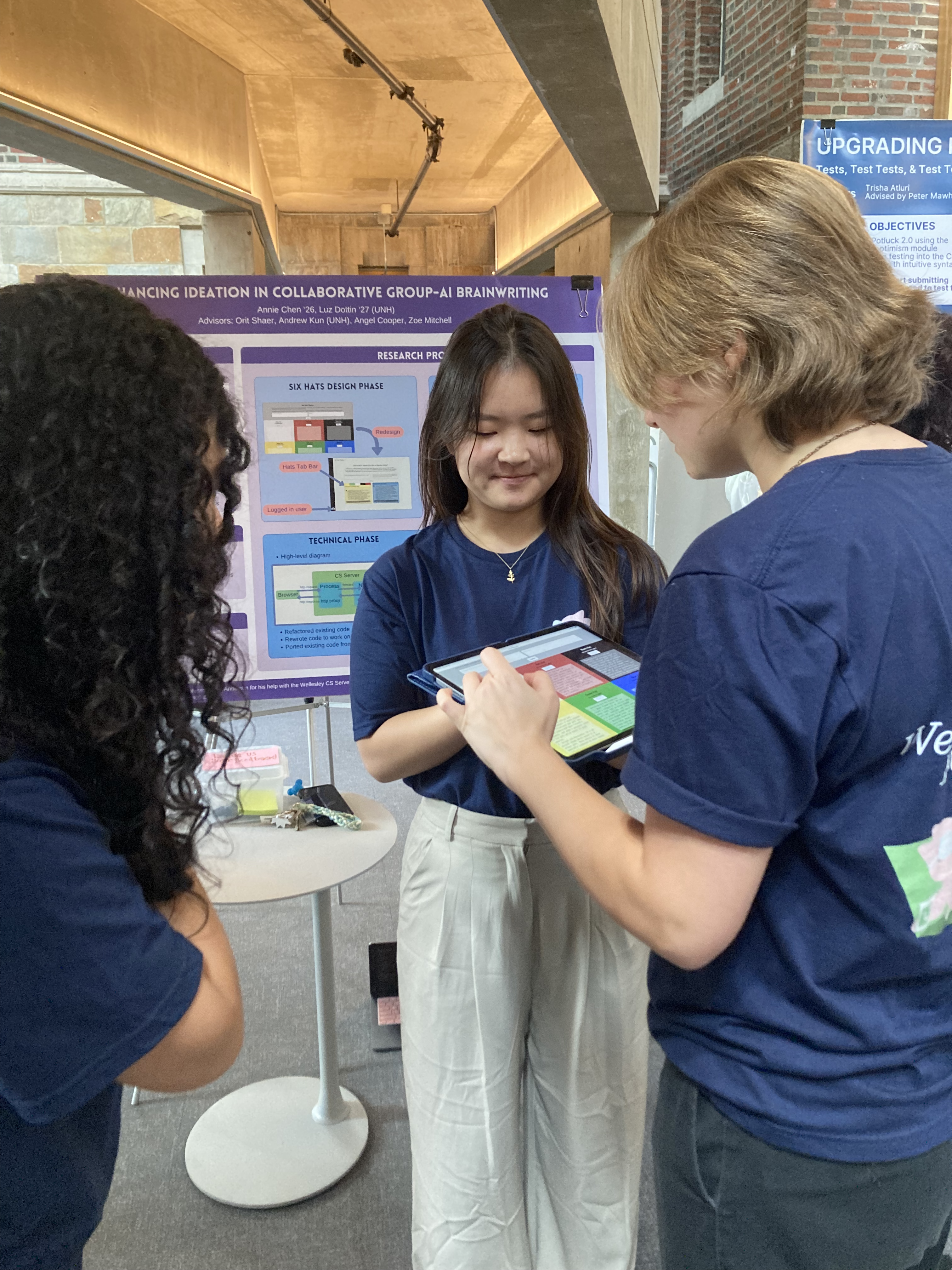Policies
Class Meetings
Our class will meet Mondays and Thursdays from 2:20-3:35 PM in Science Center Hub H401. Occasionally, we will meet in alternate locations as noted on the course schedule.
Office and Drop-in Hours
Brian's office hours and tutor/teaching fellow drop-in hours are posted in our office and drop-in hours document.
The times/locations will be the same each week unless we decide to make a change to better accommodate student's schedules or space needs.
Office and drop-in hours will be cancelled on any days when classes are cancelled.
If hours need to be cancelled or temporarily moved for any other reason, student's will be notified by email through the course Google group.
Prerequisites
Fulfillment of the Quantitative Reasoning (QR) component of the
Quantitative Reasoning & Data Literacy requirement.
No prior background with computers is expected.
Computer Science Department Guidelines
As a part of this course, students and faculty are expected to adhere to the Computer Science Department Guidelines, which are designed to create a positive and productive learning environment. These guidelines emphasize respect, integrity, inclusivity, and transparency, ensuring that our department prepares students to lead in a world shaped by computation and data. For a detailed description of these principles and guidelines on attendance, timeliness, respect for others, exam policies, and how to share your thoughts with us, please refer to the Computer Science Department Guidelines Document.
Topics
- Web Fundamentals (Internet, HTML, CSS)
- JavaScript Programming
- Information Representation in Computing
- Introduction to Artificial Intelligence and Machine Learning
- Web Development with AI Integration
- Societal Impacts of AI (ethics, democracy, privacy)
- Data and Bias in AI Systems
Textbook, Readings, and Materials
We will be using a zyBook titled "Web Programming". ZyBooks is an interactive learning platform that integrates text and learning activities. To access the book:
- Sign in or create an account at zyBooks
- Enter zyBook code: Provided in course email
- Subscribe - there is NO cost for a subscription
In addition, we will read research and news articles as well as book chapters. Access to these readings
will be available online or through the course Google Drive.
Course Requirements
The course requires active participation in class through discussion and hands-on lab activities.
Students are required to prepare for class by completing the reading prior to lecture, arrive to class on time, actively participate in discussions, and submit all hands-on lab activities. Frequent questions and especially wrong answers are strongly encouraged.
There course has two different types of assignments: practice and assesment.
- Practice assignments are mostly activities in the textbook completed outside of class and graded for completion. E.g., completing 80% of an assignment scores 80/100.
- Assesments are graded for correctness and cover all reading materials, practice assignments, and content discussed/practiced in class.
In addition, the course has a final project that requires working in teams to investigate a topic at the intersection of AI and society. As part of your team project, you will be expected to do the following:
- Draft a team contract
- Develop a project proposal
- Conduct a literature and media review on your topic
- Design and present a short lesson or classroom activity on your topic
- Develop a project website to share and promote your work
- Reflect on your own learning and contributions to the project
The dates of the assignments and project milestones are listed on the course schedule.
Grading Policy
This course's grading is Mandatory Credit/Non-Credit (or Credit/Non), meaning that no letter grades are assigned.
To earn credit for this class, all criteria below must be met:
- Your average of the assessments must be at least 70 (after dropping the two lowest scores).
- Your average of the practice assignments must be at least 75
- Your total project score must be at least 75
- Regular attendance on time in accordance with the course attendance policy.
If you meet all of the above criteria, you will earn credit for this class. If you meet only two or three of the above criteria, you will not earn credit for this class.
Late Assignments
The late assignment policy differs by type of assignment:
- Practice assignments:
You are strongly encouraged to submit practice assignments by the deadline, but may submit up to 48 hours late.
- Project milestones: Project milestone deadlines should be treated as hard deadlines and should not be submitted late. However, we understand that coordinating group schedules is difficult. Teams may request a 48-hour extension on a project milestone deadline by meeting with the instructor at the end of a lecture. However, some milestones (e.g., class presentations) cannot be submitted late.
- Assessments: Assessments are conducted in class and you must be present on that date to take them. However, we will drop the two lowest scores. If you are not able to attend class when an assesment is given, the default policy will be to count that assessment as one of your two dropped assessments.
If you need extra time beyond the lateness policy outlined above, you should contact the class dean
and discuss a plan for completing your assignment. We will work together
to make sure that plan is a reasonable and effective so that it supports
both your learning and your health.
Using Generative AI
Aligned with its learning goals, this course encourages students to explore
responsible and critical engagement with generative artificial intelligence (GAI)
tools such as ChatGPT, Gemini, DALL·E, Midjourney, Claude, and Bard. The use of GAI or AI
powered tools is restricted and is allowed only when assignments specifically allow or require the use of such tools. Any use of AI powered tools in this course must follow the
CS110 policy on using GAI.
We draw your attention to the fact that different classes at Wellesley implement
different AI policies, and it is the student's responsibility to conform to expectations
for each course.
Collaboration
The Wellesley College Honor Code applies to CS110. This course emphasizes collaboration,
as working effectively within teams is an important part of the innovation culture.
Working with a team provides you with opportunities to develop and improve interpersonal,
communication, leadership, and follower-ship skills.
We strongly encourage you to get to know all of your classmates and collaborate extensively
with them. Because of the interdisciplinary nature of this course, you may be strong in some
areas, but weak in others. Please share your strengths and feel free to ask others for help.
Here is a summary of the collaboration policy:
- In-class activities and discussion: This class requires
your active contribution during our time together. Please come to class prepared and ready
to contribute to our learning community. During class you will work in groups on various activities.
- Practice assignments: You are encouraged to collaborate with others when completing your practice assignments, but this is not required.
- Assessments: Collaboration on assessments is not allowed. Any form of collaboration with other students, people, or AI is a violation of the Honor Code.
- Project: Teams of 3-4 students work together to complete and submit project
milestones. You will be assigned to a team based on shared interests, preferred working styles, and schedule availability.
Electronic device policy
Despite being a tech-focused course, we will limit the use of technology during lecture time.
The goal of this policy is to support a focused, engaged, present, and professional learning environment.
We should all be together in one space, separate from the rest of the world, and concentrating on learning with each other.
We will give reminders of this policy before and during class as needed.
- Using tablets for note-taking with a stylus is allowed. All notifications should be turned off (not just silenced) and no unrelated apps should be open.
- Laptop use in class is not allowed except when explicitly required for in-class activities or following along with a coding example.
- If you need to use a laptop for note-taking, please reach out to me ASAP to discuss this accommodation. In this case, only your notes should be open, and all notifications should be turned off (not just silenced).
- Phone use in class is not allowed. Phones should be silenced and put away/not visible unless they are explicitly required for an activity.
- Recording of lectures or using automatic transcription is not allowed.
- We recommend putting devices away even during the time before class begins and getting to know the people at your table who you will be working with on in-class activities, but this is not required.
- Of course, all of these restrictions are subject to exceptions for individual needs/accommodations. Please reach out to me anytime to discuss this.
Attendance policy
Attendance on time is required.
- You are allowed 4 unexcused absences except on our final presentation days.
This is intended to account for illnesses and other unavoidable absences that occur during the semester.
You do not have to tell me why, but should email by the start of class time to let me know.
You are responsible for getting notes from another student to make up for missed content.
- An excessive amount of unexcused absences may result in not receiving credit for the course.
- If you need to miss more than 4 classes or need to miss a presentation day, please contact me to discuss a plan for keeping up with the content or taking an incomplete if necessary.
- Attendance includes arriving on time to participate in lecture, discussion, and group activities. Every 2 late arrivals will be counted as an unexcused absence.
If you struggle with attendance or being on time, I’m happy to meet with you to discuss a plan for improvement.
One simple strategy for being on time is to give yourself a reason to arrive early.
Health-related accomodations
If you are feeling ill or believe that your being in class might pose a risk to others,
please do not come to class. Please be in touch with us at your convenience to let us know what is
happening. We will then work with you to help you get back on track *after* you feel better.
We also understand that illness may require you to seek an extension on a deadline
– we can work with each of you individually.
Slides will always be available online after the lecture, as well as all the activities.
Should you have to miss a class, your first resort is to get the notes from other
students. After reviewing these notes and the materials on the course website, feel free to
be in touch with us for additional help. We will not record in person lectures.
Disabilities
If you have a disability or condition, either long-term or temporary, and need
reasonable academic adjustments in this course, please contact Accessibility and Disability Resources (ADR)
to get a letter outlining your accommodation needs.
You should request accommodations as early as possible in the semester, or before the
semester begins, since some situations can require significant time for review and
accommodation design. If you need immediate accommodations, during the semester,
please arrange to meet with me as soon as possible. If you are unsure, but suspect
you may have an undocumented need for accommodations, you are encouraged to contact
ADR. They can provide assistance including screening and referral for
assessments.
Computing and Laboratory Environment
We will primarily use the following platforms during the course:



